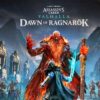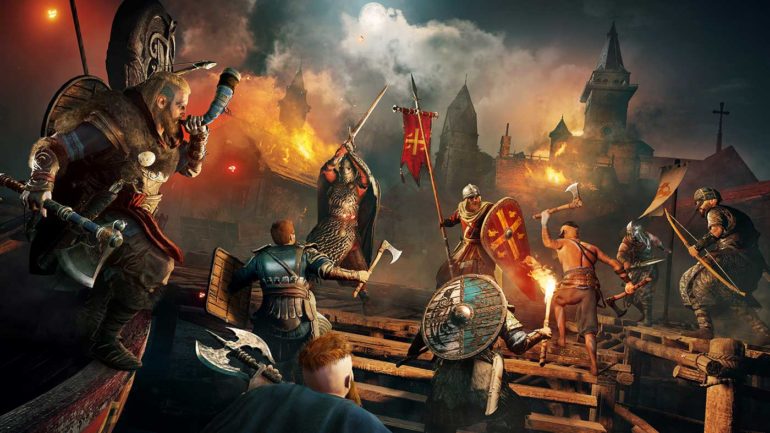Ahead of Assassin’s Creed Valhalla’s announcement, we had the chance to talk to Creative Director, Ashraf Ismail. Ashraf was the Creative Director behind Assassin’s Creed: Origins and also Assassin’s Creed IV: Black Flag before it.
We spoke about how Vahalla pushes the franchise forward, new combat mechanics, the continued push towards becoming a fully fledged RPG, pet companions and how next-gen technology has helped improve the world of Assassin’s Creed Valhalla.
- Everything You Need To Know About Assassin’s Creed Valhalla
- We Spoke To Creative Director Ashraf Ismail And Got All The New Game Details
- Assassin’s Creed Valhalla Will Have Wolves And Other Pet Companions
- Assassin’s Creed Valhalla Will Let You Dual Wield Any Weapon And Has More Enemy Variety
- Next Gen Tech Has Helped Assassin’s Creed Vahalla With Faster Loading And A World Unlike Anything Before
We’ve also got a bunch of other Assassin’s Creed:Valhalla content which you can find right HERE
Why norse mythology and Vikings this time around? Why did it feel right for the series?
Ashraf Ismail: Assassin’s Creed has always lived in exploring these pivotal moments in history, and the Viking Age is an incredible time period, it shaped Europe, It gave birth to the England we know today. So, a lot of really world impacting things happened during this time. And the Viking Age itself is named after one of history’s most notorious warrior cultures. This this time period was absolutely brutal. This was a moment when a huge invasion of Vikings came to England to settle and conquer this land, which gave birth to the England we know today. It’s a really amazing time period, there’s a lot of really wonderful stuff in terms of history.
Everything that we know about Vikings has been written after the fact, so to be able to go to this time period and using research and historians to bring this culture and this time to life is a really intriguing moment for us. it’s not something that has been achieved to the degree that I think Assassin’s Creed can do it, so there’s a lot of opportunity here. On a personal level, since I was very young, I read a Michael Crichton novel that was about Vikings, and from that very young age I fell in love with that time period and this culture, so to be able to personally, bring my own take to that is a very personalal passion project as well.
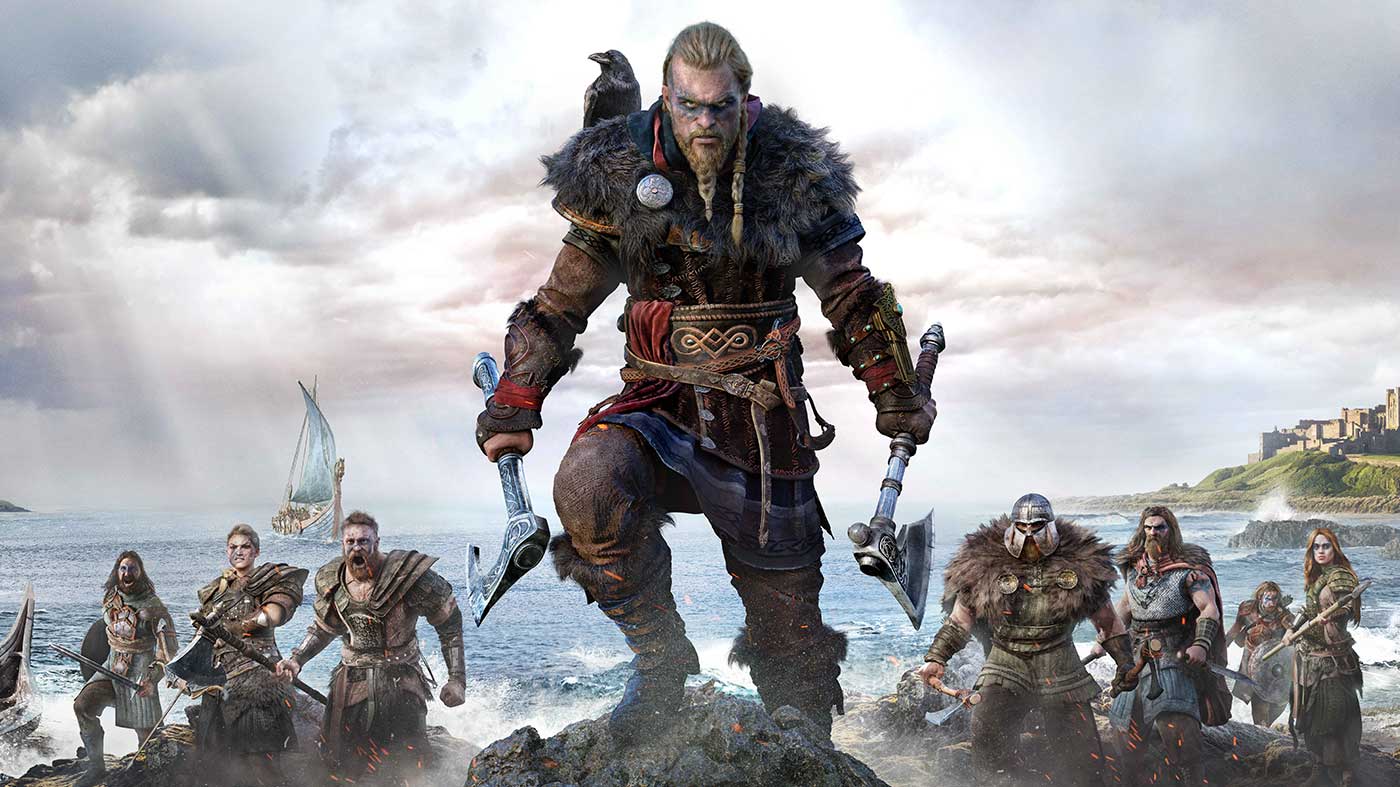
I feel like Vikings have made a resurgence in the last three or four years. What are some of the more recent inspirations that you’ve, looked to when creating this game?
Ashraf Ismail: Well, honestly our main inspirations is actually more of the research that we’ve done working with historians. Again, we started this project very early knowing that we we’e going to the Viking Age, the ninth century, Dark Ages of England, so we teamed up with people like Dr. Jackson Crawford who’s a professor in Norse language. We took a trip to Norway and to England to try to soak in as much of the details as much of the history, as much of the culture that we can and that’s really what’s inspired us. I feel like in other forms of media, Vikings have this image of being brutal warriors and they were, but there was another side to it they were also farmers and settlers and explorers. They were people with families, and we’ve been inspired to show that full picture. Yes, this was a warrior culture and this was a history a time period of war for many kingdoms, many factions fighting one another. So we wanted to tell that whole picture and all its nuanced view.
Based on the art that I’ve seen, obviously Norway and England are polar opposites. Could you talk a little bit about the differences between them gameplay wise and also how the transition works in game?
Ashraf Ismail: Our hero Eivor is a Norse Viking Raider, so he/she are from Norway, and very early in the game you get to experience Norway, and you understand the difficulty of living in this really beautiful place where there’s a a lot of space to row, lots of war happening and so very early in the game Eivor will leave Norway, with his/her people for the rolling hills of England where there’s farmland and opportunity. So when we reach, England, Eivor has a very similar role which is to settle people and to grow a thriving settlement. So all of a sudden the settlement is a big new feature of the game that is at the heart of the motivation of the journey, the character. As an example, every building that we can place in the settlement, has a gameplay value. You can invite people to arrive into your settlement and they bring something along with them.
So the settlement is a really big, key feature of the game. But at this time, England is not very welcoming to Vikings, so players to succeed, players will go on raids. So you have a long ship you have a raiding party, your Raiders are people that you can find in the world, they are people that you go on journeys with, there’s characters within the raiding party that you can customize as well. So the raiding party, raiding itself, the longship these are all big new features of the game. This is based on a lot of battles that happened during this time period, the players will go on these epic fortification attacks.
The combat itself, if you’re going to do a game that represents a Viking and the Viking experience, you have to nail combat in all its visceral nature. So the weaponry, the feeling of impact, the feeling of that thump when axe hits into something we needed to deliver on that, so combat has had a huge reinvention towards that sort of more brutal weighty angle.
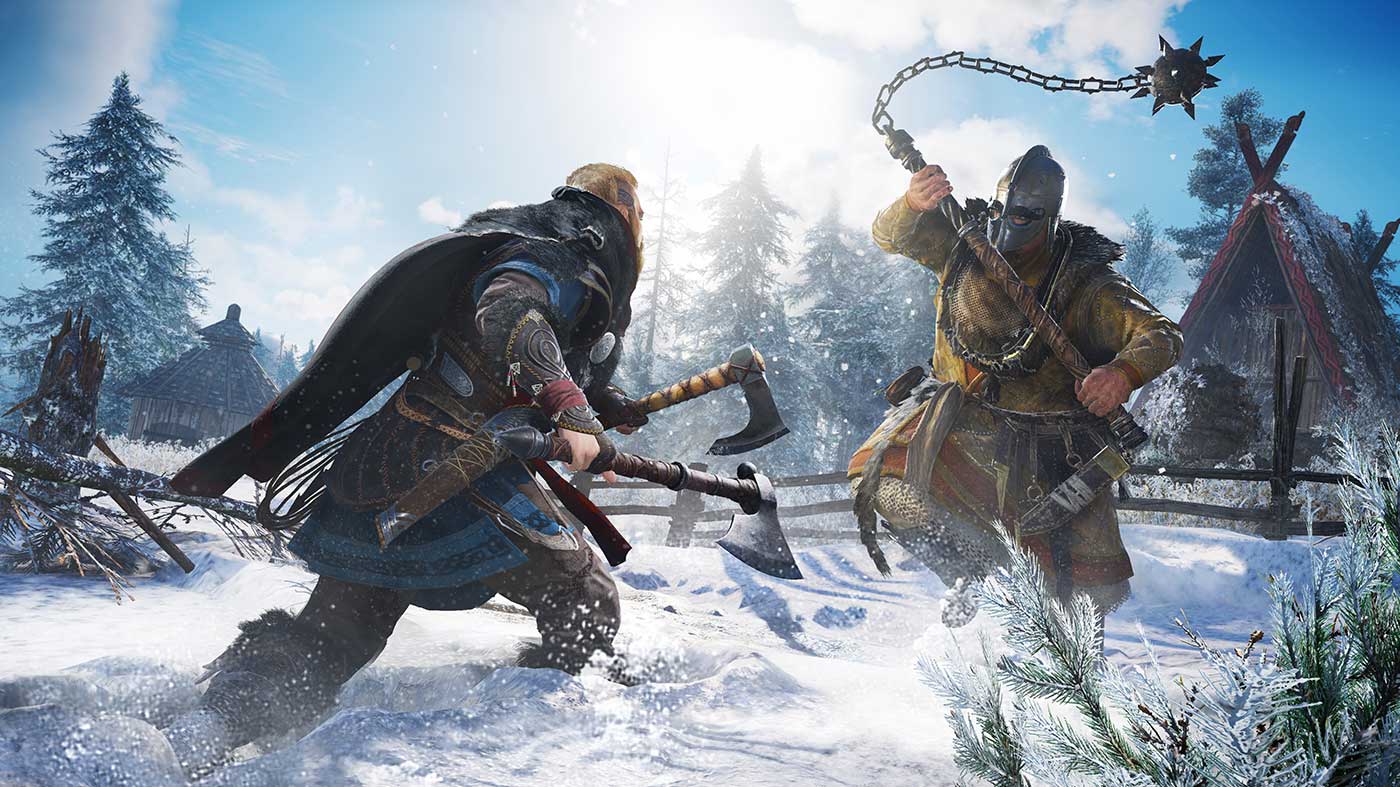
We saw Odin mentioned in the trailer. What level of norse mythology can we expect to see in the game and how supernatural will things get?
Ashraf Ismail: For this game we’re anchored and grounded in the history of the ninth century, Norway and Dark Ages England and the way we treat the Norse beliefs, is really based on a lot of the research that we know about this time so it’s really more in the vein of, it’s a cultural thing, it’s an everyday thing, so people see symbols, people see signs in the world, when they see a squirrel running by that has a meaning, that’s Ratatoskr and he’s sending a message to someone. So the angle that we’re approaching with is that Eivor is someone who believes, of course, in these sagas and stories of the gods. This is part of the culture. Of course, Eivor will have his own take on it. So we are in personal journey with Eivor, so we are seeing people from Eivor’s perspective of course, but that’s about all I can say without spoiling too much, but there’s definitely a few hints in the trailer.
In Odyssey, you got to choose between two separate characters (one female and one male) where in Valhalla you get to choose between a male/female variation of the same character in Eivor. Why was this decision made?
Ashraf Ismail: So, with Eivor players do have the choice to play Eivor as male or female. That’s a choice that players get to make in the game. But the goal was to deliver a singular character’s journey through this tumultuous insane time period. We wanted to tell a very personal story within this really grand setting. That’s been the artistic decision that we had in the beginning. Of course we do allow our players to have a choice within that frame, so yes, players can play as male or female, but it was important for us to tell a specific story that we had in mind.
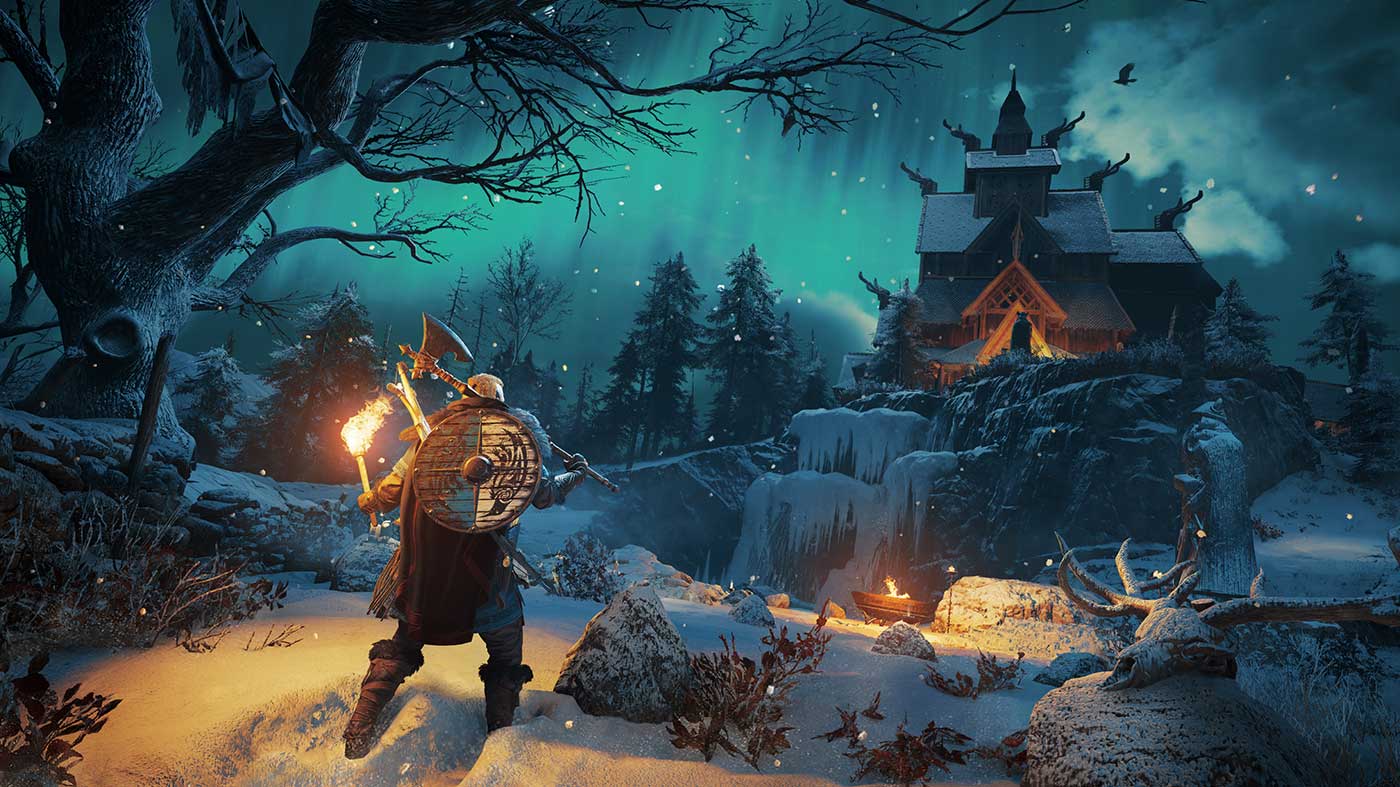
How does the story fit in with Odyssey and Origins. Can we expect to see familiar characters?
Ashraf Ismail: So this game so Valhalla is is anchored within the Assassin’s Creed franchise. Of course, in terms of timeline it comes a little bit before AC1, and much after Origins, so there is a deep link in the lore of the Assassin’s Creed. Again, it’s really important for us that we deliver the Vikings experience within the Assassin’s Creed world, those two elements are part of the journey that we’re building, so for sure there’s some surprises. I won’t get into which characters you might meet, but it’s deeply rooted into the assassin lore
Beginning with Origins the goal was to move the series towards RPG elements. Could you talk a little bit about how this is pushed even further in Valhalla?
Ashraf Ismail: So in terms of RPG and progression, our goal was to actually bring in kind of a fresh new take on it. Something that is much more anchored into the world itself and into the concepts of skills and so on. We do have a very different take than what we’ve previously done, all in the hopes of actually making the Viking experience shine a bit more.
So as an example, we have this giant skill graph. It’s a really large skill tree where players can really customise the kind of Viking they that they want to play as. Hopefully people see a lot more play style customisation within that. Our angle is much more about letting players, sort of, enjoy the experience of the game as they want. In terms of of the RPG progression. So a lot of effort has gone into these skills. We have the return of abilities, but of course all the abilities are again anchored and rooted and very Viking themed We’ve gotten rid of the idea of levels as well. Instead we now have power, so again power is something that is rooted in the skill set of the hero. So based on the skills you’ve learned you gain power, and so there’s been a shift in the way we handle RPG and progression to make it a more play-style centered and focused on what players out there want to do in the game.
Can we still expect to see branching dialogue?
Ashraf Ismail: There is dialogue choices and branching dialogue. Eivor is a character who is a Viking Raider, who has ambition and glory, sort of something they want to deeply achieved, but they’re also a leader within their community, so at a certain point players will be faced with choices that sort of tear at this personal ambition versus the needs of the people. And so, players will have a voice within that moment.
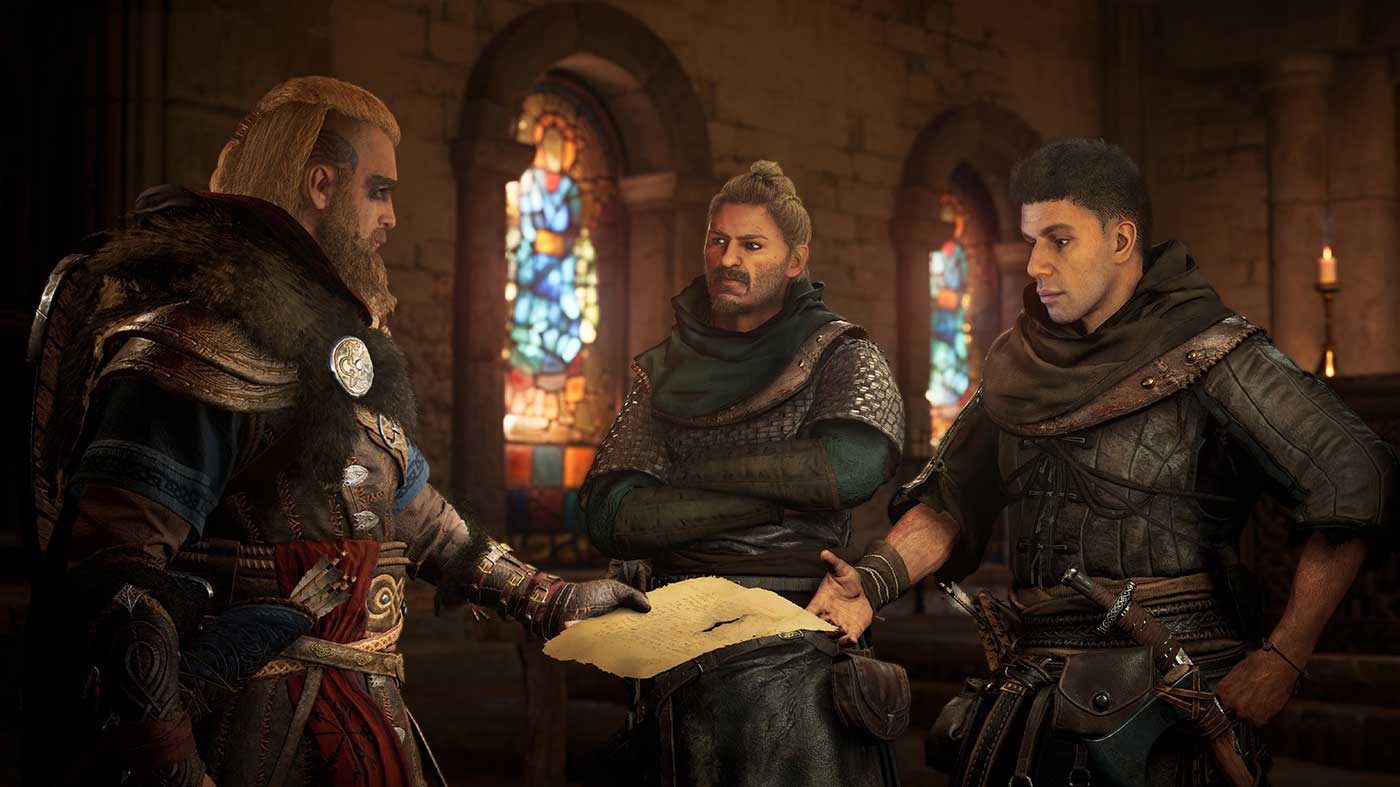
How has combat evolved or chanced since Odyssey?
Ashraf Ismail: Yeah, so the combat system has been reinvigorated to really showcase the visceral newness and brutality of the time period of the weaponry of warfare during this ninth century. So, a lot of effort has been put into making sure sense of impact. We make have bearded axes, dane axes, flails, but now we’ve included the dual wielding capacity, so you can combine any two weapons in your hands. So you can dual wield two axes, two swords, even two shields if you want, so we’ve made the system quite flexible. The third element to combat improvement is the effort we’ve put into the variety of enemies, that are incredible unique using the environment and using one another against the hero. We wanted to make sure that if you’d been playing for 15-20 hours, that you were still seeing stuff you’ve never seen before so a lot of effort has gone into the enemy side of combat.
I definitely spotted some wolves in the trailer. Will they or any other pet companions feature in the game?
Ashraf Ismail: There’s different forms when it comes to animal companions. I don’t want to go into specifics, but yes, there is an ability at some point where you can call in a wolf to come and help you. There’s other journeys in the game that will more or less involve other animals, so it’s a different take but yes animals have a space within the journey.
How has naval combat changed?
Ashraf Ismail: Again, based on a lot of research and speaking to historians and experts. The biggest success of the Vikings was that they have this incredible piece of technology called the long ship, and they have these roads that no one is driving on called rivers, and they’re able to zoom in and out without anybody stopping them. This is how they gain success in England and in Europe, because they were able to get in behind enemy lines with with no defenses and no one’s stopping them. So what we wanted to achieve is to make sure that players felt the power of the long ship of being able to traverse through the land to carry their crew to carry the Raiders to eventually start seeing some of these defenses in England that have been put up to try to slow down this Viking invasion. So, players will have a long ship, they’ll have a crew and again this is really to make that part of the history really shine and resonate and understand why it’s so powerful, and the longship is at the heart of also doing raiding is a big feature of the game. It’s a way to gain resources to weaken enemies and it all starts with the long ship.

I’d love to know more about raids and settlements. Are we talking like tower defence? How big of a part does this play in the game?
Ashraf Ismail: No, not tower defense, so raiding, it’s really going out into the world. You’re out into England to attack various enemies, various factions to weaken them to gain resources using your raiding party and you bring back those resources to your settlement, and you use those resources to grow your settlement. Growing the settlement is really about the people, it’s about the relationships, it’s about the buildings that you put in that a lot of gameplay features rely on. There’s customization that you can do in the settlement itself. The settlement is part of the the personal journey of Eivor and we want players to make it their home and to make it a place that they can come back to feel comfortable in and know every single face in the community, to be able to have a relationship with these people.
I saw that the game’s tagline was to ‘Subdue and Conquer England’. Could you please talk a little bit about that?
Ashraf Ismail: England is a hostile land so yes there’s raiding there’s assault, but one of the big things that players will have to get into is to gain alliances with Kings, with Vikings that are there. And so, players will go out into the world into England, we are we’re at the time period right now where there are four major kingdoms. There’s North Cumbria, East Anglia, Mercia and New Essex. So during this time period we go out into these various kingdoms, and we meet the leaders, whether they’re friends or foes or people that we have to work with and you go on a journey to try to either subdue your enemies, remove them, make alliances and that’s the higher level questing structure, if you will. It’s really about going out into England and trying to create a sense of place for your settlement within the rest of England, and making sure that your enemies will not hurt your settlement or your people.
A lot of people felt that Odyssey forced you to grind to certain parts of the game to take on certain enemies or missions. Has that been looked at and balanced here?
Ashraf Ismail: Well, with Valhalla, with the balancing of the game, it’s our angle, our goal is to just let players play the content they want. Again we built a really intriguing world that takes place in Dark Ages England and Norway. By the way, when you leave Norway to England, you can always go back to Norway, so we built these really beautiful breathtaking living worlds, and we want players to play the content as they wish to play it. That’s the way the game is being balanced. So, people want to focus on narrative, there’s no issue there, people want to focus on their settlement, again, no issue there. It’s really up to players to decide how they want to consume the content. That’s always been our angle and again, this, we’re showcasing Eivos’ personal journey, we’re really focused on that. So again, if people want to focus on that personal journey and the relationships that come out of that they can do that.
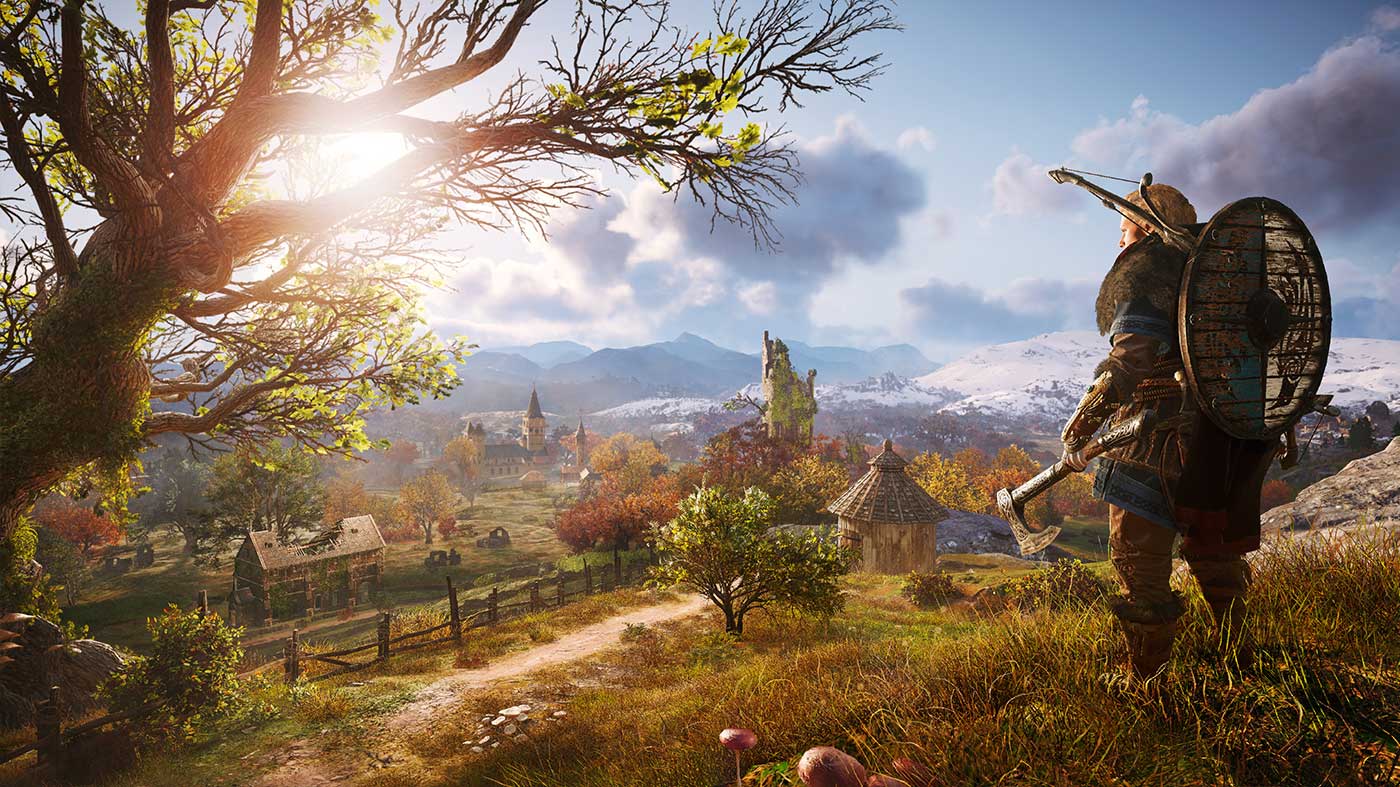
2020 is a big year for gaming and with Assassin’s Creed Valhalla confirmed for next gen consoles, what are some of the things that new technology has made possible for this game that weren’t possible 4-5 years ago with Origins?
Ashraf Ismail: We are committed to new technology. Assassin’s Creed Valhalla will launch with the next generation of consoles and you know, technology for us allows us to build more and more immersive experiences, that’s our objective, that’s our goal, we want to deliver the most immersive experience we possibly can. And so we are quite committed to new technologies. You know, for example, having significantly faster loading times. This allows us to remove some of the friction with that emerging technology. This is really wonderful for us. Additionally, the worlds we’re building now are unlike anything we’ve built in the past in terms of their their detail. The amount of stuff that we can put so the more we can push the incredible potential of these worlds of Norway and ninth century, Dark Ages England. It’s better for the game it’s better for the immersion, it’s better for our players. So those are some of the ways where we’re allowing technology to really enhance what we’re making.
Fans of the series have been wanting multiplayer or co-op to return in some form for a while. Will we see any multiplayer or co-op in Valhalla?
Ashraf Ismail: Well, Assassin’s Creed Valhalla is a single player game with many online components. So, other features are enhanced by being online and we allow players to share a lot stuff online., but it is a single player game.
Assassin’s Creed Valhalla will release on PS5, Xbox Series X, PS4, Xbox One, PC and Google Stadia this Holiday.

